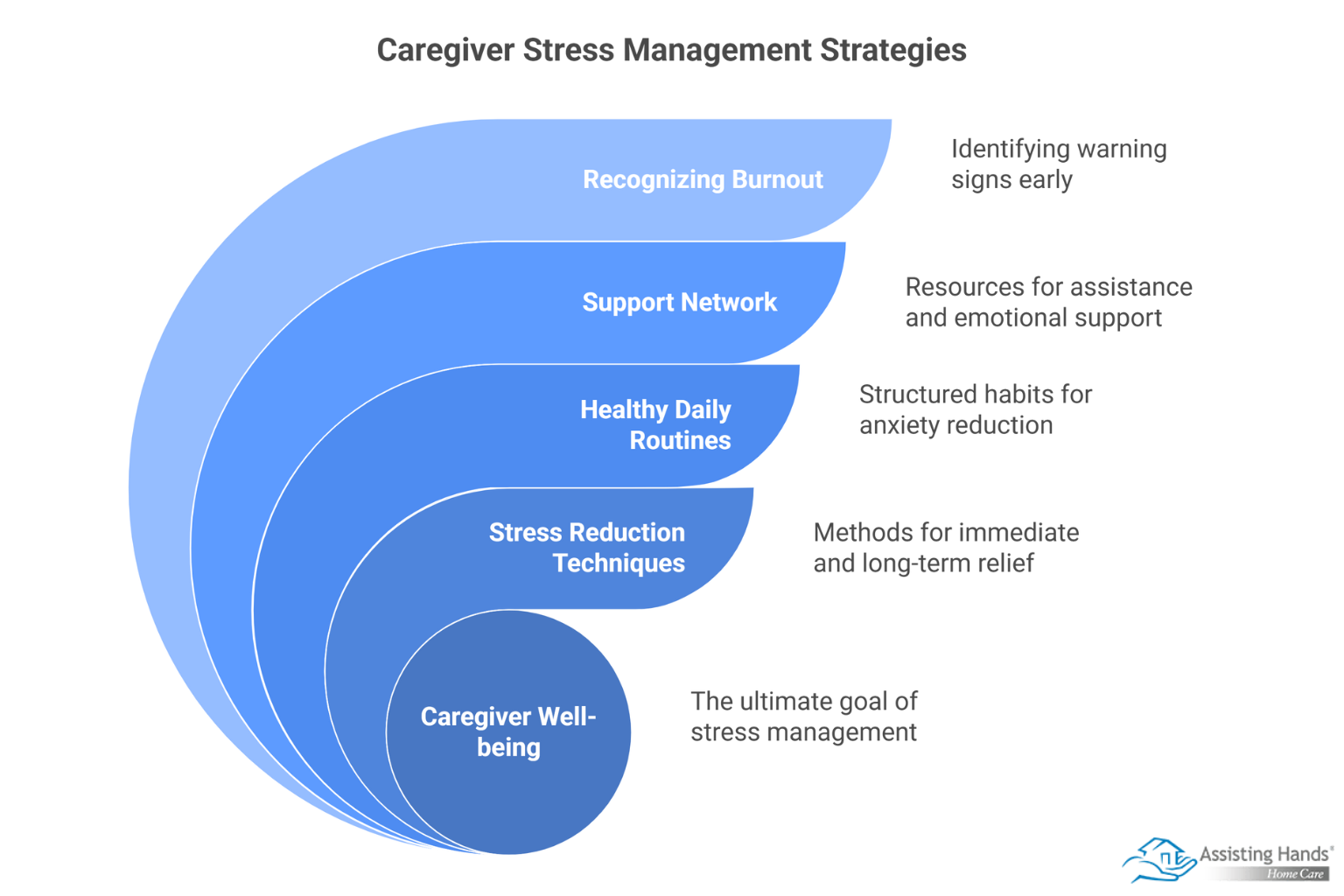
Table of Content
Caring for a senior loved one presents unique emotional and physical challenges that can overwhelm even the most dedicated family members. The demanding nature of caregiving can lead to chronic stress, affecting both your health and your ability to provide high-quality care.
Recognize the Warning Signs of Caregiver Burnout
Understanding when stress becomes overwhelming helps you take action before reaching a crisis point. Caregiver burnout develops gradually, making it easy to dismiss early warning signs as temporary fatigue.
Watch for these physical and emotional indicators:
- Chronic exhaustion that doesn’t improve with rest
- Frequent headaches, muscle tension, or unexplained aches
- Changes in appetite or sleep patterns
- Increased irritability or mood swings
- Feeling overwhelmed by daily caregiving tasks
- Social withdrawal from friends and family
- Neglecting your own health needs or personal hygiene
Recognizing these symptoms early allows you to implement stress management strategies before burnout severely impacts your wellbeing and caregiving abilities.
Seniors can face a variety of age-related challenges. Though some families choose to take on the caregiving duties, there may come a time when they need a trusted elderly home care provider. Families sometimes need respite from their duties so they can focus on their other responsibilities, and some seniors need around-the-clock assistance that their families are not able to provide. Assisting Hands Home Care is here to help.

Build a Strong Support Network
Creating reliable support systems reduces isolation and provides practical assistance when you need breaks from caregiving responsibilities. Effective support networks include both professional services and personal relationships.
- Professional support options
- Adult day programs that provide supervised care and social activities
- Respite care services offering temporary relief for several hours or days
- Home caregivers who assist with personal care tasks
- Support groups for caregivers
- Personal support systems
- Family members who can share caregiving responsibilities
- Friends willing to provide emotional support or practical help
- Religious or community organizations offering volunteer assistance
- Online caregiver communities for advice and encouragement
Don’t hesitate to ask for help or accept offers from others. Many people want to support you but need specific guidance about how they can assist most effectively.
For some families, caring for a senior loved one can be overwhelming at times. Luckily, they can rely on professional respite care. Wilmington, MA, Assisting Hands Home Care is a trusted name in respite and hourly care. Our caregivers are available around the clock to assist seniors with bathing, transportation, medication reminders, exercise, and much more, allowing families the time they need to focus on other important responsibilities or just take a break.
Establish Healthy Daily Routines
Maintaining structured routines benefits both you and your loved one by reducing anxiety and creating predictable patterns. Consistent schedules help you manage challenging behaviors while ensuring you maintain essential self-care practices.
- Morning routines
- Start each day with a few minutes of quiet reflection or meditation.
- Eat a nutritious breakfast before beginning caregiving tasks.
- Review the day’s schedule to prepare for appointments or activities.
- Throughout the day
- Take short breaks every few hours, even if just for five minutes.
- Stay hydrated and eat regular meals.
- Engage in brief physical activity like stretching or walking.
- Connect with one supportive person through phone calls or messages.
- Evening wind-down
- Establish calming activities that signal the end of the caregiving day.
- Practice relaxation techniques such as deep breathing or listening to gentle music.
- Prepare for the next day to reduce morning stress.
Practice Stress Reduction Techniques
Learning effective stress management techniques provides immediate relief during difficult moments and builds long-term resilience. Choose methods that fit your lifestyle and preferences, focusing on techniques you can implement quickly when stress levels rise.
- Quick stress relief methods
- Deep breathing exercises that take only 2–3 minutes
- Progressive muscle relaxation starting with your shoulders and neck
- Brief mindfulness practices focusing on present-moment awareness
- Listening to calming music or nature sounds
- Longer-term stress management
- Regular exercise appropriate for your fitness level and schedule
- Journaling to process emotions and track stress patterns
- Meditation or prayer practices that align with your beliefs
- Creative activities like drawing, crafts, or gardening
Experiment with different approaches to discover what works best for your situation. Even five minutes of intentional stress relief can significantly impact your emotional state and energy levels.
Maintain Your Physical and Mental Health
Prioritizing your own health needs ensures you can continue providing high-quality care while protecting your long-term wellbeing. Many caregivers neglect personal health, leading to serious medical problems that compromise their caregiving abilities.
Essential health practices
- Schedule regular medical checkups and don’t postpone necessary treatments.
- Take prescribed medications consistently.
- Get adequate sleep by establishing good sleep hygiene habits.
- Eat balanced meals rather than relying on convenience foods.
- Stay physically active through activities you enjoy.
Mental health support
- Consider counseling or therapy to process caregiving challenges.
- Join support groups with other dementia caregivers.
- Practice stress management techniques consistently.
- Recognize when you need professional mental health intervention.
Remember caring for yourself is essential for sustainable caregiving. Your loved one benefits when you maintain good physical and mental health throughout the caregiving journey.
Family caregivers need to care for their own wellbeing. If you’re caring for an aging loved one and are feeling overwhelmed, consider hiring a professional caregiver to provide at-home care. Wilmington families who want to prevent burnout can turn to Assisting Hands Home Care. One of our professional caregivers can assist your loved one at home while you take a nap, go to work, run errands, or go on vacation. To learn about our high-quality in-home care options, give us a call today.








